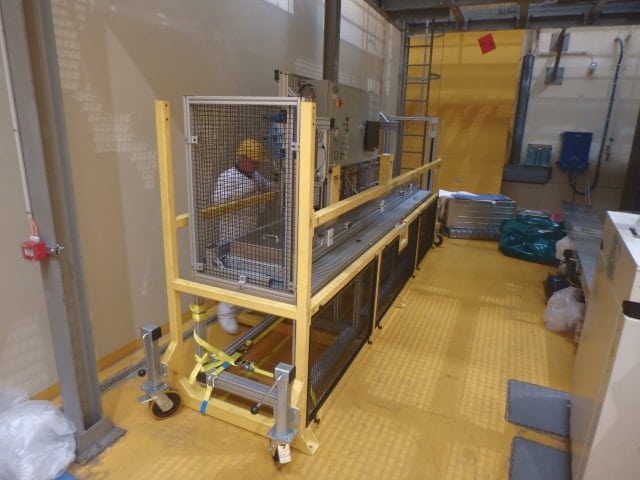As part of the presentation of new UNITECH service offers, we have organized a consortium with the company GDES ENERGY SERVICES (holder of many contracts on CNPE EDF, which has a great experience of work in industrial and nuclear) and with the intense collaboration of Benoît CHEVILLEY (PGAC pilot of the site) an experiment using our scaffold radiological monitoring monitor on the St ALBAN NPP in July 2017. The objective being:
– Experiment with the logistics and deployment on the monitor’s site.
– Demonstrate the effectiveness of controls (measurements, rapid identification of contaminated elements)
– Demonstrate the high level of productivity of the controls.
The experiment was carried out with a sample of potentially contaminated scaffolds from the recent outage.
Working Group and Roles:
– UNITECH SERVICES: Monitor Supplier and Operational Training.
– GDES Energy Services: Logistics Assistance (installation/dismantling), control operations.
– EDF PGAC St Alban: Assistance to the tests (guarantee of easements, safety, etc.)
This experiment made it possible to precisely identify the needs in terms of logistics and deployment of the monitor as part of an operational simulation in real conditions.
The goal is to be able to deploy a control site as quickly as possible within the framework of an exploitation site.
Successful deployment will depend on:
– The ease and speed of connection to energies (gas, compressed air, electricity).
– A site area large enough for unloading / reloading and moving the monitor to the work area.
This test phase showed that:
– The monitor can be deployed on site very quickly (about 3h) and its logistics is facilitated by transporting all equipment in 20 ” containers.
– The radiological control phases have clearly demonstrated the ability of the monitor to identify quickly and very precisely the contaminated areas on the controlled elements.
All these associated points confirm the high level of productivity of UNITECH’s radiological scaffolding monitor. It is important to note that the monitor was used under experimental conditions and for the first time outside a UNITECH factory, although some technical issues still need to be improved or ‘industrialized’ to facilitate deployment and operation.
This experiment in collaboration with GDES ENERGY SERVICES is globally a success and corresponds to a significant need on the EDF nuclear fleet.





